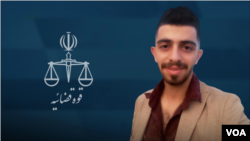Iran has sentenced an activist from its Azerbaijani Turk ethnic minority to an effective three-year prison term for joining a public protest last year in support of Azerbaijan while it engaged in a brief conflict with neighboring Armenia, according to a knowledgeable source.
In a January 8 interview with VOA Persian from Iran, the source said a Revolutionary Court in the northwestern city of Urmia issued a verbal notification of the sentence to the lawyer of activist Salar Taher Afshar on January 2. The source said the verdict followed a December 14 trial attended by both the lawyer and the activist in Urmia, the largest city in Iran’s West Azerbaijan province.
Taher Afshar received a three-year sentence for the charge of participating in an illegal gathering and a one-year sentence for the charge of spreading antigovernment propaganda, the source said.
Authorities had arrested Taher Afshar on July 16 last year after he joined pro-Azerbaijan street protests that day in Urmia and several other predominantly Azerbaijani Turk cities in northwestern Iran. VOA’s Azerbaijani service had reported that heavy deployments of Iranian security forces dispersed the protests and made arrests.
Taher Afshar was released on bail after a six-day detention and has remained free in Urmia pending an outcome to the trial. VOA’s source said the activist’s lawyer plans to appeal the three-year and one-year prison sentences in the coming days.
Under Iranian law, Taher Afshar would have to serve only the longest of the prison terms, three years, if they are confirmed on appeal.
But, the source said the activist also would have to serve an additional eight-month term related to a previous conviction for participating in Urmia street protests as part of Iran’s nationwide antigovernment demonstrations of November 2019. He had been arrested on November 20 of that year and released on bail sometime later.
A West Azerbaijan criminal court had convicted Taher Afshar of disrupting public order in the protests and sentenced him to eight months in prison and 20 lashes following a January 15, 2020 trial, but it suspended the punishments for a three-year period, the source said. The eight-month term would be added to Taher Afshar’s three-year term for joining the July 2020 protests if the latter sentence is upheld on appeal, the source added.
VOA cannot independently verify the judicial actions against Taher Afshar because it is barred from reporting inside Iran. There was no mention of them in Iranian state media.
Weeks of deadly border battles between Azerbaijan and Armenia erupted on July 12, 2020. The former Soviet republics later escalated their decades-long conflict into a six-week war that began in late September and centered on the Armenian-controlled and populated enclave of Nagorno-Karabakh within Azerbaijan. The fighting ended in November with a Russia-mediated peace deal.
Last month, Iran sentenced another Azerbaijani Turk activist, Ali Azizi, to an effective five-year prison term for his peaceful campaign against discrimination of his minority group by the Islamist rulers of the Persian-majority nation.
Iran’s Azerbaijani Turks number as many as 15 million people, according to a March 2018 report by Britain-based organization Minority Rights Group International (MRG). Iran’s total population is about 85 million, based on a July 2020 estimate in the U.S. CIA World Factbook.
Many of Iran’s Azerbaijani Turks speak a dialect that the Iranian government does not allow to be taught in schools. Azerbaijani Turk activists have criticized the ban, saying it violates Article 15 of Iran’s constitution, which allows for “the use of regional and tribal languages in the press and mass media, as well as for teaching of their literature in schools.”
Iran’s Islamist rulers have long feared that permitting the official use of Turkic dialects in the country could promote separatism among minorities.
This article originated in VOA’s Persian Service. Click here for the original Persian version of the story.





